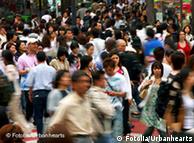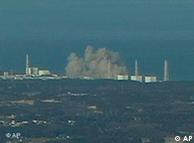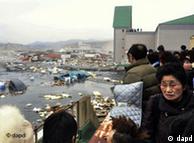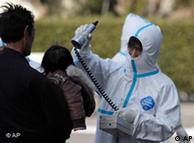Disasters | 15.03.2011
福島第一4号機で再び火災、建屋の壁の穴から炎確認
2011年3月16日7時33分
東京電力によると、16日午前5時45分ごろ、福島第一原発4号機の原子炉建屋4階北西付近から炎が上がっているのを、4号機の中央制御室に計測機器用 バッテリーを運んでいた社員が屋外から確認した。15日に出火したのと同じ場所で、建屋の壁にあいた穴から炎が見えたという。爆発音は確認されていない。
東電から通報を受けた消防署から、消防車4台、消防隊員13人が発電所に向かっているが午前7時現在で正門には到着していない。ただ、同原発敷地内では 昨日、毎時400ミリシーベルトという高い放射線量が測定されている。東電は現場付近の線量を測ってから消防隊と消火方法を確認する。
社会アクセスランキング (9時21分現在)
Radiation poses health risk in Japan after two new blasts
Radioactivity levels have returned to normal after reaching dangerous levels in Japan on Tuesday. Radiation rose around the country's earthquake-damaged Fukushima nuclear power complex after two new explosions hit reactors on Tuesday morning. They are the third and fourth blasts since Saturday.
"There is no doubt that unlike in the past, the figures are the level at which human health can be affected," said chief government spokesman Yukio Edano.
Edano said that radiation levels on Tuesday morning were 30 millisieverts between Number 2 and Number 3 reactors, 400 millisieverts near Number 3 and 100 millisieverts near Number 4.
A single dose of 1,000 millisieverts - or one sievert - causes temporary radiation sickness, such as nausea and vomiting. A dose of five sieverts is enough to kill about half of those people exposed to it within a month.
Warnings issued
The Japanese government has urged people living within a 30-km radius of the nuclear facility to stay indoors and a 30-km no fly-zone has been imposed around the reactors.
Meanwhile, the plant operator has pulled out 750 workers. Just 50 remain to battle the ongoing threat of fire and explosions at the plant.
 Bildunterschrift: Großansicht des Bildes mit der Bildunterschrift: Radioactivity levels in Tokyo have already risen
Bildunterschrift: Großansicht des Bildes mit der Bildunterschrift: Radioactivity levels in Tokyo have already risen
Between 6:00 a.m. (2100 GMT Monday) and 6:15 a.m. an explosion hit the Number 2 reactor of Fukushima Dai-ichi nuclear power plant, a spokesman for Tokyo Electric Power Company (TEPCO) said. By 8:31 a.m., radiation levels there had exceeded eight times the legal limit for exposure in one year.
In a televised address, Japanese Prime Minister Naoto Kan told the nation there had "been a fire at the Number 4 reactor" and that radiation levels in the surrounding area had "heightened significantly."
"We are making every effort to prevent the leak from spreading," he said. "I know that people are very worried but I would like to ask you to act calmly."
Ongoing crisis
The fire has reportedly been extinguished since the prime minister's announcement, according to Japanese media, but the situation surrounding reactor number four remains volatile.
Japanese news agency, Kyodo reported that the water in the containment pool of reactor number four was boiling. If it evaporates, the nuclear fuel rods will be exposed to air, possibly causing them to catch fire and release radioactive material.
Authorities have said that they may use helicopters to pour water into the containment pool in the coming days in an effort to cool it down.
"They've got to get the fires out, keep the fires out and keep the water from boiling," said Murray Jennex, a professor at San Diego State University in California.
Radiation in Tokyo
Experts suggested that radiation drifted 250 kilometers away from Fukushima to the capital, Tokyo on Tuesday.
Authorities detected higher than normal radiation levels in the capital but said they posed no heath threat. Nevertheless, residents have been fleeing the city and shops are reporting panic buying.
 Bildunterschrift: Großansicht des Bildes mit der Bildunterschrift: Four explosions have hit Fukushima's reactors Numerous countries have also imposed flight restrictions to Tokyo. Airlines from Asia and Europe announced on Tuesday that flights to Tokyo will be halted amid fears that radiation had reached the capital.
Bildunterschrift: Großansicht des Bildes mit der Bildunterschrift: Four explosions have hit Fukushima's reactors Numerous countries have also imposed flight restrictions to Tokyo. Airlines from Asia and Europe announced on Tuesday that flights to Tokyo will be halted amid fears that radiation had reached the capital.
Lufthansa said planes will be diverted to the Japanese cities of Nagoya and Osaka, hundreds of kilometers west of the capital.
A spokesman for the airline said that the diversion could last until the weekend, adding that flights which returned from Tokyo on Monday had been checked for radioactivity and no traces were found.
Several countries, including Germany, have issued warnings against travel to the country. The German Foreign Ministry website states that "non-essential travel to Japan is inadvisable."
Catastrophe
Japanese markets reacted to the increased concern on Tuesday with the Nikkei Index plunging some 13 percent. The steep decline in share prices over the last two days has wiped some $720 billion (517 billion euros) off the market.
 Bildunterschrift: Großansicht des Bildes mit der Bildunterschrift: Millions are without running water and electricityThere have been a total of four explosions at the Fukushima nuclear power complex in northeastern Japan since it was damaged in Friday's massive earthquake and tsunami. The most recent were blasts at reactors Number 2 and 4 earlier on Tuesday.
Bildunterschrift: Großansicht des Bildes mit der Bildunterschrift: Millions are without running water and electricityThere have been a total of four explosions at the Fukushima nuclear power complex in northeastern Japan since it was damaged in Friday's massive earthquake and tsunami. The most recent were blasts at reactors Number 2 and 4 earlier on Tuesday.
Experts say Japan's current nuclear disaster is the world's worst since the 1986 Chernobyl meltdown in Ukraine.
Meanwhile, the full extent of the damage from the earthquake and the resulting tsunami that destroyed the northeastern Miyagi prefecture were still becoming clear. Officials say the death toll could reach over 10,000 people were killed and tens of thousands more were missing as a result of the quake, the world's fourth most powerful since 1900.
Authors: David Levitz, Gregg Benzow, Charlotte Chelsom-Pill (AP, dpa, AFP, Reuters)
Editor: Michael Lawton

沒有留言:
張貼留言